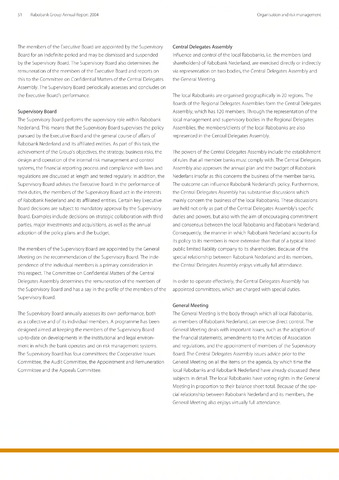51 Rabobank Group Annual Report 2004
Organisation and risk management
The members of the Executive Board are appointed by the Supervisory
Board for an indefinite period and may be dismissed and suspended
by the Supervisory Board. The Supervisory Board also determines the
remuneration of the members of the Executive Board and reports on
this to the Committee on Confidential Matters of the Central Delegates
Assembly. The Supervisory Board periodically assesses and concludes on
the Executive Board's performance.
Supervisory Board
The Supervisory Board performs the supervisory role within Rabobank
Nederland. This means that the Supervisory Board supervises the policy
pursued by the Executive Board and the general course of affairs of
Rabobank Nederland and its affiliated entities. As part of this task, the
achievement of the Group's objectives, the strategy, business risks, the
design and operation of the internal risk management and control
systems, the financial reporting process and compliance with laws and
regulations are discussed at length and tested regularly. In addition, the
Supervisory Board advises the Executive Board. In the performance of
their duties, the members of the Supervisory Board act in the interests
of Rabobank Nederland and its affiliated entities. Certain key Executive
Board decisions are subject to mandatory approval by the Supervisory
Board. Examples include decisions on strategic collaboration with third
parties, major investments and acquisitions, as well as the annual
adoption of the policy plans and the budget.
The members of the Supervisory Board are appointed by the General
Meeting on the recommendation of the Supervisory Board. The inde
pendence of the individual members is a primary consideration in
this respect. The Committee on Confidential Matters of the Central
Delegates Assembly determines the remuneration of the members of
the Supervisory Board and has a say in the profile of the members of the
Supervisory Board.
The Supervisory Board annually assesses its own performance, both
as a collective and of its individual members. A programme has been
designed aimed at keeping the members of the Supervisory Board
up-to-date on developments in the institutional and legal environ
ment in which the bank operates and on risk management systems.
The Supervisory Board has four committees: the Cooperative Issues
Committee, the Audit Committee, the Appointment and Remuneration
Committee and the Appeals Committee.
Central Delegates Assembly
Influence and control of the local Rabobanks, i.e. the members (and
shareholders) of Rabobank Nederland, are exercised directly or indirectly
via representation on two bodies, the Central Delegates Assembly and
the General Meeting.
The local Rabobanks are organised geographically in 20 regions. The
Boards of the Regional Delegates Assemblies form the Central Delegates
Assembly, which has 120 members. Through the representation of the
local management and supervisory bodies in the Regional Delegates
Assemblies, the members/clients of the local Rabobanks are also
represented in the Central Delegates Assembly.
The powers of the Central Delegates Assembly include the establishment
of rules that all member banks must comply with. The Central Delegates
Assembly also approves the annual plan and the budget of Rabobank
Nederlans insofar as this concerns the business of the member banks.
The outcome can influence Rabobank Nederland's policy. Furthermore,
the Central Delegates Assembly has substantive discussions which
mainly concern the business of the local Rabobanks. These discussions
are held not only as part of the Central Delegates Assembly's specific
duties and powers, but also with the aim of encouraging commitment
and consensus between the local Rabobanks and Rabobank Nederland.
Consequently, the manner in which Rabobank Nederland accounts for
its policy to its members is more extensive than that of a typical listed
public limited liability company to its shareholders. Because of the
special relationship between Rabobank Nederland and its members,
the Central Delegates Assembly enjoys virtually full attendance.
In order to operate effectively, the Central Delegates Assembly has
appointed committees, which are charged with special duties.
General Meeting
The General Meeting is the body through which all local Rabobanks,
as members of Rabobank Nederland, can exercise direct control. The
General Meeting deals with important issues, such as the adoption of
the financial statements, amendments to the Articles of Association
and regulations, and the appointment of members of the Supervisory
Board. The Central Delegates Assembly issues advice prior to the
General Meeting on all the items on the agenda, by which time the
local Rabobanks and Rabobank Nederland have already discussed these
subjects in detail. The local Rabobanks have voting rights in the General
Meeting in proportion to their balance sheet total. Because of the spe
cial relationship between Rabobank Nederland and its members, the
General Meeting also enjoys virtually full attendance.

